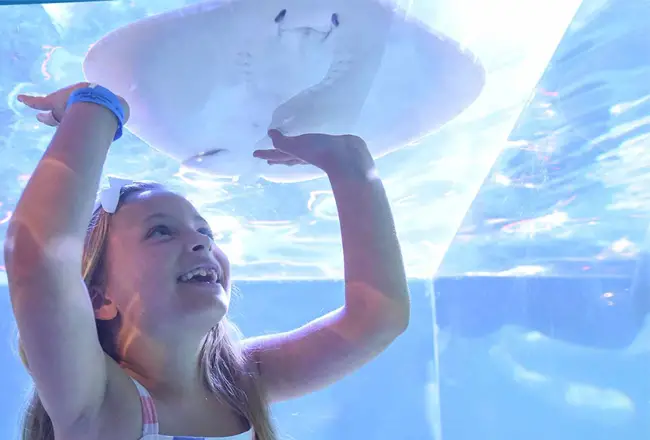The latest chapter in the ongoing evolution at malls ”“ toward offering more of an experience than simply shopping or dining ”“ arrives in June with the long-awaited opening of “interactive aquarium” SeaQuest at the Westfield Trumbull.
Construction on the 17,000-square-foot facility ”“ which promises not just the chance to don a wet suit and snorkel with (nonlethal) rays and baby sharks, but also observe and play with everything from otters to baby pigs and a variety of reptiles ”” began in late 2018.

“How we differ from traditional aquariums is to try to make everything interactive,” said SeaQuest Trumbull General Manager Nancy Loshuk. “That”™s especially attractive to kids, who can pet or feed an animal, rather than just walking through exhibits.”
But the experiences may not always be as animal-friendly as they seem, according to animal rights organizations and news reports.
“SeaQuest has an abysmal record of violating laws and regulations,” said Debbie Leahy, manager, captive wildlife protection at The Humane Society of the United States. “They”™re treating animals as disposable and charging the public to handle and harass animals that would rather be left alone. And it’s been documented that they keep animals hungry so they”™ll be more willing to interact with people, which has resulted in people being bitten by adders, sharks, rays and iguanas.”
The Maritime Aquarium at Norwalk also objects to SeaQuest, issuing a statement that, unlike Bridgeport”™s Beardsley Zoo, the Mystic Aquarium and itself, “we are concerned when we read that SeaQuests”™ operations in other locations not only have fallen short of (Association of Zoos & Aquariums) standards, they have triggered criminal charges and regulatory fines in response to their care of animals and their attempted procuring of species from the marine environment.”
To achieve accreditation from the AZA, a facility must pass an application and inspection process and meet or exceed the nonprofit”™s standards for animal health and welfare, fund-raising, zoo staffing and involvement in global conservation efforts. SeaQuest has chosen not to pursue such accreditation.
The criticism is nothing new for the Boise, Idaho-based firm, which has weathered controversy at nearly all of its five locations. Last year the state of Colorado issued a cease-and-desist order to the SeaQuest in Littleton for operating without a valid license and in violation of the Pet Animal Care Facility Act. Former employees at the Las Vegas location went public with tales of animal mistreatment, with a May 14 report saying “deaths, lies and cover-ups were considered standard operating procedure.” Protests about animal cruelty have greeted the news that SeaQuest plans to open in a Fort Lauderdale mall.
A January report by the Sacramento Bee about the People for the Ethical Treatment of Animals (PETA) demanding that animal services of the nearby town of Folsom investigate allegations of inhumane practices included a quote from SeaQuest CEO Vince Covino: “So the animal dies after 10 a.m., and it”™s impossible for you to be looking at every animal in every tank every minute of the day, so it”™s going to mean at any zoo or any aquarium, an animal can die and it might be a guest that found it.”
SeaQuest insists that it is playing by the rules. Vice President of Marketing and Public Relations Elsa MacDonald said the company operates on “three basic pillars ”” care for animals, care for our employees and the care and welfare of our guests at each facility.”
She also said that SeaQuest employs “quality team members with biology and animal care backgrounds,” many of whom have worked at zoos and other aquariums in the past, and that staff veterinarians regularly visit each facility to maintain detailed health records on each animal. SeaQuest has also added national-level animal husbandry and marine experts.
The animals are sourced from various state wildlife and fish and game sources, MacDonald said, as well as rescued snakes and the like from families that decide they can no longer adequately care for them. Some animals naturally breed while in SeaQuest”™s care with the offspring often deployed to other locations.
Each SeaQuest sees about 250,000 to 300,000 visitors per year, she added, noting that plans call for another three facilities to open this year.
MacDonald said Sea-Quest”™s origins could be traced to Covino”™s childhood, when he and his brother Ammon set up a touch-tank in their front yard and charged neighbors and passersby to interact with the creatures.
Ammon Covino was sentenced to federal prison in December 2013 for conspiring to illegally purchase spotted eagle rays and lemon sharks.






















